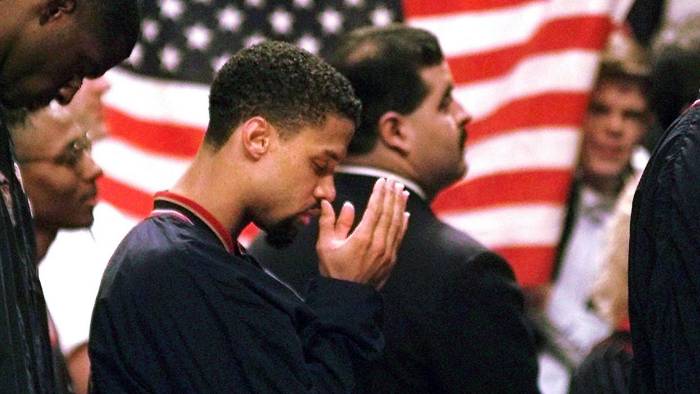Thinker's Notebook
Will We Ever Forgive the NFL?

During the 1995-1996 NBA season, Denver Nuggets point guard Mahmoud Abdul-Rauf made the decision to not stand and salute the American Flag during the playing of the National Anthem before the start of the game. He wasn’t demonstrative about it, he simply did not stand and salute the flag, choosing instead to stretch himself along the sidelines, or to stay in the locker room. He did this for a few games before anyone noticed. When a reporter decided to ask him about it, Rauf did not hold his tongue. He told the reporter that he viewed the American Flag as a symbol of racism and oppression. He stated that standing and saluting such a symbol would conflict with his religious beliefs. He said, “You cannot be for God and for oppression.” His comments created a national uproar on the issue. The NBA suspended Rauf for one game, without pay, for violating a rule that states that all players must line up in a dignified posture during the singing of the National Anthem. Rauf met with NBA execs and they actually came up with a compromise. When Rauf returned to the court on March 15, 1996, he did stand for the singing of the National Anthem. But instead of saluting the flag, Rauf stood in silent prayer. He continued to do this throughout the rest of the 1996 season.
The backlash that Rauf experienced was just despicable. He received death threats. His home was burned to the ground. Although he ended the ‘95-’96 season leading his team in points per game and assists per game, Rauf was traded at the end of the season to the Sacramento Kings. In Sacramento, Rauf’s playing time decreased significantly, to the point where he was no longer starting or even playing much. In 1998, when his contract expired, Rauf’s career in the NBA was over. Teams wouldn’t even call him in for a tryout, and he was one of the best point guards of his era. From a league perspective, the NBA stayed true to the rules. Players had to be standing in a dignified posture for the anthem, period. There wasn’t much in the way of backlash from the public-at-large. I don’t remember people protesting the league’s decision to suspend Rauf, and I certainly don’t remember people calling for a boycott of the NBA. The NBA Finals that year drew an average of 19 million households for every game.
Twenty years later, Colin Kaepernick made the decision to take a knee in silent protest of the National Anthem. His decision was also met with a national uproar on the issue. He did receive death threats, but his house wasn’t burned to the ground. The NFL didn’t suspend him for a game, but at the end of the 2016-2017 season, Kaep chose to opt out of his contract with the San Francisco 49ers and to become a free agent. Aside from a couple of brief opportunities, Kaep’s career took a deathblow because of his silent protest. He’s been out of football ever since. Most importantly though, the consumer attention on the issue has been constant, and last year there were many Americans who boycotted the league in support of Kaep.
Why didn’t the NBA’s handling of Mahmoud Abdul-Rauf create the same rebellious buzz amongst its market as the NFL’s handling of Kaep did? Comparing the two situations, it would seem that the NBA’s reaction was more worthy of public scrutiny. The NFL didn’t suspend Kaep, but the blackball job they did on him was more acute than the way Rauf lingered before finally being sent into limbo. Social media hyperrealizes everything, and so the Kaep issue had millions more eyes on it than the Rauf issue did. No one even knew what Rauf was doing until a reporter asked him to explain it. The true litmus comparison though is in the nature of each protest. Rauf’s protest in 1996 was about the symbol. He said that the flag was a symbol of oppression and that he couldn’t in good conscious stand and salute it. Even in its specificity, such a protest is still vague in focus. It was the symbol being protested and not a bigger indictment on the culture. Kaep’s protest was not about the flag. Kaep’s protest was about the culture of America, specifically the killing of Blacks by law enforcement officers. This protest puts a name and a face into the gauntlet, drawing America into its most flawed attribute, its ideals about race. The NBA compromised with Rauf by letting him pray during the anthem because who can argue sides on such a vague reason to protest. There was no compromise offered regarding Kaep’s protest because any compromise would be an acceptance of blame and white America has still yet to fully come to grips with its accountability with regards to race. Nor do they wish to. Not today. Not tomorrow.
The 2018-2019 NFL Football season starts on September 6, 2018. America’s greatest sport will kick off its 99th season. Maybe in time, those who choose to boycott the league for its handling of Kaep will move past the facts and begin to love the game again. Maybe in time. But I doubt that happens this year. There is still this question of the culture of America, and as long as the NFL chooses to purposely ignore that question, many former fans will ignore the games. Are you ready for some football? Not really.


